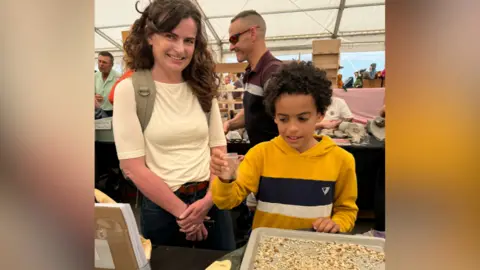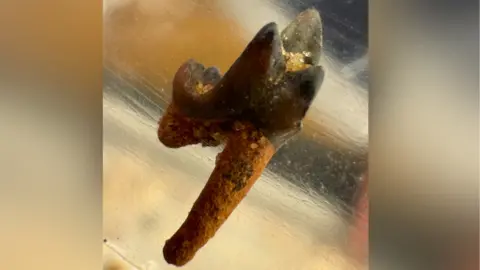Boy unearths rare mammal fossil at festival
 Natural History Museum
Natural History MuseumA tooth unearthed by a seven-year-old boy at a fossil festival has been identified as being a rare find from an ancient mammal.
James, from Wareham in Dorset found the tooth in sand brought for the Natural History Museum activities Lyme Regis Fossil Festival.
It was identified as belonging to a prototomus, a meat-eating animal similar in size to a size of a weasel or mongoose.
The museum's Dr Neil Adams said it was a "very nice find".
 Natural History Museum
Natural History MuseumMore than 33 stone (210kg) of soil was transported for Abbey Wood, a fossil-rich site in southeast London.
James was one of more than 500 people who sifted through the soil searching for ancient remains.
He found shells and shark teeth but the molar tooth could not be immediately identified.
Dr Adams, curator of fossil mammals at the Natural History Museum, identified the find, which has now been donated to the museum, as a rare fossil tooth from an ancient animal called prototomus.
The small predator lived more than 55 million years ago. It belonged to a group of animals known as the hyaenodonts and would have been about the size of a weasel or mongoose.
 National History Museum
National History MuseumDr Adams said: “These fossils are pretty rare, and there’s only a handful of prototomus remains in our collections.
“Even though it’s just a single tooth, studying the dental microwear on it could reveal more about the last days to weeks of the animal’s life, and what it was eating.
"Not a lot of this microwear research has been done on early Eocene mammals, especially the carnivores, so I think there’s a lot of interesting work to come.”
James said the fossil hunting activity at the festival was a "really fun thing to do".
" I enjoyed knowing that if I found something I liked I got to take it home.
"It was weird to come across the mammal tooth because it had so many points on it and I didn’t know what it was.”
Follow BBC South on Facebook, X, or Instagram. Send your story ideas to south.newsonline@bbc.co.uk.
